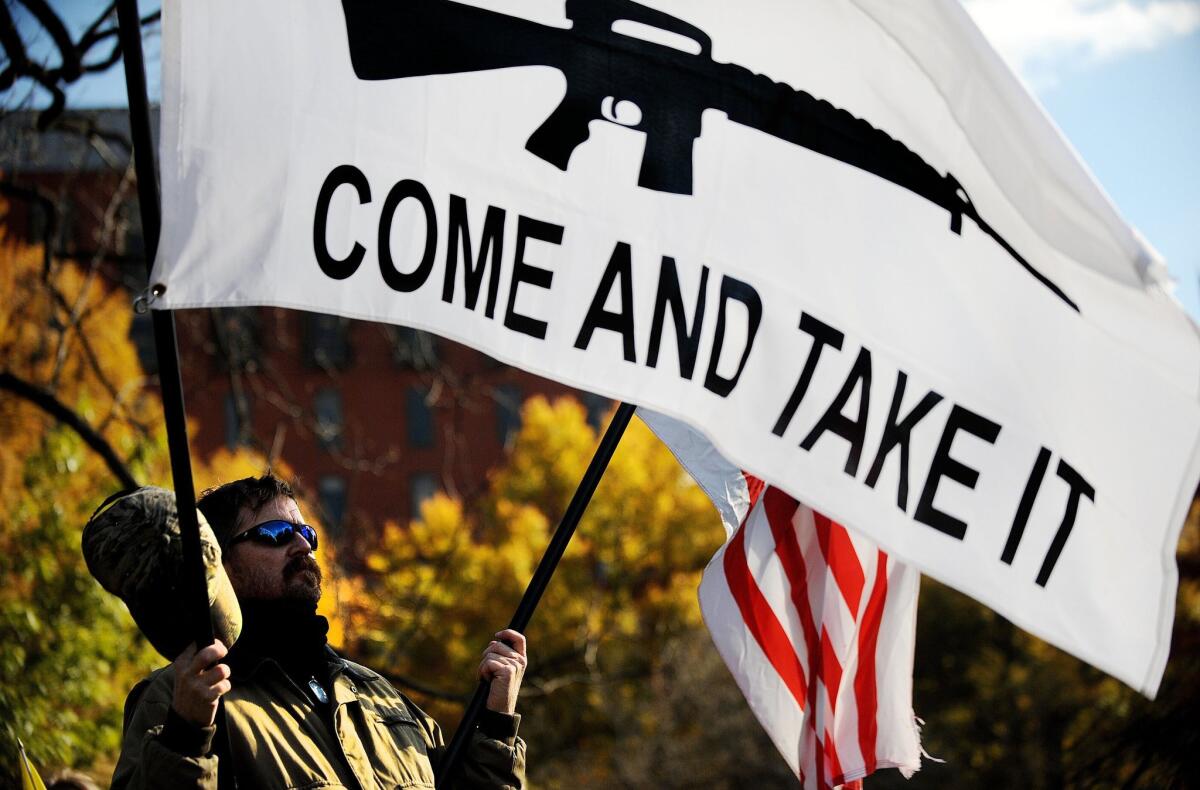White House seeks to tighten gun background checks on mentally ill

- Share via
WASHINGTON — The Obama administration on Friday unveiled two measures to bring more mental health records into the federal background check system for gun purchases, the first new proposals on firearms violence since a spate of gun control bills died in Congress last spring.
The proposed changes, which don’t require congressional action, fall far short of the ambitious agenda the administration launched early in 2013 in the wake of the Sandy Hook school massacre in Connecticut. Many gun sales are not covered by background checks, and Congress seems unlikely to revisit that issue any time soon.
One new rule would change confusing definitions in the law to make clear that people who have been ordered to receive outpatient mental treatment — not just those involuntarily committed to a psychiatric facility — are prohibited from buying guns.
If such a rule had been in place in 2007, it may have prevented gun purchases by Seung-hui Cho, the Virginia Tech student who killed 32 people in a campus rampage.
The ban still would not apply to those who voluntarily seek treatment or check themselves into a hospital. Although some states have broader rules, the federal definition also doesn’t apply, without a hearing, to people who were hospitalized for brief stays.
Cho had been ordered by a judge to receive treatment, but because he was not institutionalized, Virginia didn’t report his name to the National Instant Criminal Background Check System, or NICS. Virginia has since begun to report such outpatient commitments, but most states do not.
Jeffrey Swanson, a Duke University professor who has studied mental health standards and gun violence, said he believes that closing the outpatient loophole makes sense, but that the move probably would not greatly expand the number of people barred from buying guns.
Advocates for people with mental illness have pushed to restrict the reporting rules, saying they unfairly stigmatize people who aren’t violent. Mental health records now account for 29% of all records in the background check database. Only unauthorized immigrants form a larger category of people barred from buying guns.
At the same time, the mental health prohibition accounts for only about 1% of all federal denials of gun sales, according to FBI data, since most of the people whose names are in the database because of mental health problems never seek to buy a weapon.
The second change would clarify federal rules on the privacy of healthcare records. Officials in some states have cited those rules as one reason for not submitting mental health records to the background check system.
The records’ gaps in the background check system have received increased attention after a string of mass shootings by people apparently suffering from mental illness. Since 2011, the number of mental health records in the database has nearly tripled, to 3.2 million.
But a number of states have reported just a few records. Reports by the Government Accountability Office and Mayors Against Illegal Guns have found that state officials cite a number of obstacles, including a shortage of funds, the challenge of rounding up and converting old paper records and, in some cases, concerns that turning over the records would violate the privacy rules of the federal Health Insurance Portability and Accountability Act, or HIPAA.
The new rule would give states and other agencies that track mental health commitment records explicit permission to submit names to the background check database. The new rules do not lengthen the list of who must report or what information gets submitted. Treatment records and other detailed information would remain private.
“There is a strong public safety need for this information to be accessible,” said Health and Human Services Secretary Kathleen Sebelius, adding that the rule was crafted to balance public safety with privacy rights.
Gun control advocates, who have been pushing to restart the debate, welcomed the new actions as an encouraging sign.
“We are happy to see the White House starting the new year with a continued resolve to end gun violence,” Shannon Watts, founder and head of Moms Demand Action for Gun Sense in America, said in a statement. “These executive orders are some of what mayors, moms and all Americans have been calling for to keep guns out of dangerous hands.”
Ron Honberg, policy and legal affairs director at the National Alliance on Mental Illness, said he was glad the administration was clarifying the law. More important, however, are the administration’s efforts to expand mental health insurance coverage, he said.
“The greater part of the problem is, people can’t get treatment when they need it,” he said.
Twitter: @JTanfani
More to Read
Sign up for Essential California
The most important California stories and recommendations in your inbox every morning.
You may occasionally receive promotional content from the Los Angeles Times.











